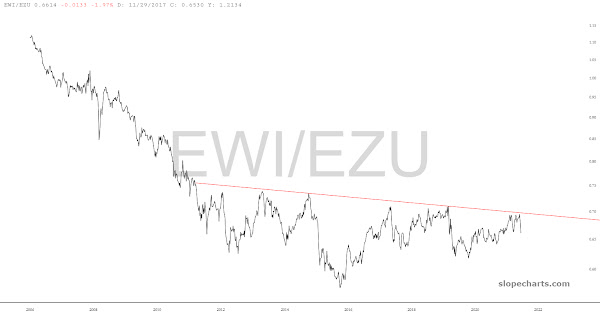As I first pointed out in April, the Greece ETF has been basing versus the German ETF.
Greece doesn't look as strong versus the Eurozone ETF, but EZU includes countries such as Italy that also look like Greece: Note that these ETFs include fluctuation in the euro, but the relative charts cancel that out.Going all the way back to the post-2008 fallout era, when Greek sovereign debt emerged almost immediately and first rattled markets in the spring of 2010, critics of the euro and European Union have explained how Greece was being harmed by the euro and austerity programs being forced on the nation without any fiscal transfers:
Would it be impossible for the Greek stock market to rally in a bear market? No. There is one outlier scenario where that happens: Greece does something extreme such as exiting the euro and redenominating its sovereign debt in drachmas. More so than most nations, Greece would benefit from currency devaluation because it's economy and assets are already devalued.
Currency devaluation is an escape valve for incompetent sovereigns. Serial devaluation shows a nation doesn't make hard choices and opts for the easy way out, impoverishing its own people and foreign investors over time. All nations will eventually devalue their currencies though, if reforms were not undertaken and credit not controlled. The mistake was blowing the bubble in the first place, not the currency devaluation that balances assets to liabilities.
Trade Implications
If Greece assets could rally on a euro exit, then Greece should outperform amid high inflation and euro weakness. The macro forces that crushed Greece in the prior decade are now turning in Greece's favor and against Germany. If trends continue for years, it might be Germany that wants out soon.
The cleanest trade here is short Germany, in local currency or in dollars via an ETF such as EWG. (Not necessarily a trade to put on Monday, but one that could have been put on in January and still held today.) Greece is not a clean buy because it will probably fall in a global bear market, but if that basing pattern turns into a breakout at any point, then I would recommend accumulating Greek assets along with Italian and other debtor countries, depressed sectors and so on during the dip because they should outperform in the next bull market. If you find a depressed asset that is harmed by a strong euro and deflation/disinflation, and it still has good underlying fundamentals, it sounds like a potentially good buy on the surface.
A breakout in the "Greece vs Germany" chart would signal a significant turn in macroeconomic forces. Conversely, if the chart were to fail (a "bear market" rally that delays the eventual breakout is not a fail) and sink again, it would tell me the post-2008 central bank trap is alive and well with potentially more QE and even more negative interest rates on the way.












No comments:
Post a Comment